- Home
- Markus Zusak
I Am the Messenger Page 10
I Am the Messenger Read online
Page 10
It's decision time.
I have to pull myself together.
It's evening now, and I'm driving into the city. The distant buildings shadow the sunset.
The night is quiet, for thinking.
The most interesting person I pick up is a prostitute-looking woman who sits in the front. Her body is hard. Physical. Her hair waves at me and her mouth is beautiful, though her teeth are ugly. Her words are blond and sweet. She ends all sentences with an endearment.
"Why the long face, honey?"
"I've never been this way before, sweetie."
Contrary to stereotypes, her makeup is very tasteful and light. She doesn't chew gum. She wears black knee-high boots, a white skivvy that gives her a lovely shape, and a dark jacket-vest.
Keep your eyes on the road, Ed.
"Honey?"
I turn to her.
"You remember where we're going, sweetie?"
I clear my throat. "The Quay Grand?"
"That's right--I gotta be there by ten, all right, sugar?"
"Sure." I give her a friendly look. I enjoy customers like this.
When we get there, the meter says eleven sixty-five but she gives me fifteen and tells me to keep the change. She leans in the window. "You look sweet."
I smile. "Thanks."
"For the cash or the compliment?"
"Both."
Now she even reaches a hand in and says, "My name's Alice." I take it and hold it. "They get to call me Sheeba, but you can call me Alice, okay, honey?"
"Okay."
"And you are?"
"Oh." I let go of her hand reluctantly and reply. She mustn't have noticed my driver ID on the dash. "Ed. Ed Kennedy."
She gives me a last endearment. "Well, thanks for the lift, Ed. And don't worry so much. Enjoy yourself, all right, sweetie?"
"No worries."
When she walks away, I imagine her turning back around and saying, "Could you come and pick me up in the morning, Ed?"
But she doesn't.
She's gone.
Alice doesn't live here anymore.
Watching her all the way to the doors of the hotel, I'm sitting in the cab, alone.
Behind me, a car blows its horn in abuse, and a man roars out the window. "Get moving, cabbie!"
He's right. We're useless.
Driving through the night, I imagine Alice turning into Sheeba. I hear her voice and smell it in the dimly lit hotel room overlooking Sydney Harbor.
"That okay, sweetie?"
"Oh, honey...."
"Yes, darlin', that's it, right there, sugar, keep going."
I see myself beneath her.
Being taken and made love to.
I feel her.
Know her.
Taste her champagne mouth.
Ignore the ugly teeth.
Just shut my eyes and taste her.
Touch her naked skin.
The skivvy on the floor.
The vest next to us.
The boots forgotten--triangled near the door.
Feel me in her.
"Oh," she says, breathless, "Ed, oh, Ed." I get lost in it. "Oh, Ed...."
"Red!" the guy in the backseat screams at me.
I hit the brakes hard.
"Christ, mate!"
"Sorry."
I suck the air in deep.
It's been nice to forget about the Ace of Clubs and Audrey for a while, but now I'm back to the reality of it. The man's voice carried with it the memory of both.
"They're green now, buddy."
"Thanks."
Driving.
At home.
I drive into town as the sun edges up the sky. All roads are empty and I pull into the Vacant Taxis lot.
Like always, I walk back to the shack.
The Doorman's happy to see me.
We drink the obligatory coffee together, and I pull the card from the drawer. I watch it, trying to get new glimpses of it--trying to catch it off guard and have it reveal its secrets to me.
The night of driving could have gone either way, but I feel ready now. I want to throw my miserable, complaining, excuse-making mouth from my face and get on with it. I even corner myself in the widening light of the lounge room. I think, Don't blame it anymore, Ed. Take it. I even move out onto the front porch and see my own limited view of the world. I want to take that world, and for the first time ever, I feel like I can do it. I've survived everything I've had to so far. I'm still standing here. Okay, it's a crummy front porch I stand on, cracked to shithouse, and who am I to say that the world isn't the same? But God knows that the world takes enough of us. The Doorman sits at attention next to me, or at least as best he can. He even looks dependable and obedient. I look down at him and say, "It's time."
How many people get this chance?
And of those few, how many actually take it?
I crouch down and place my hand on the Doorman's shoulder (or the closest thing a dog has to one), and we go off to find the stones of home.
About halfway along the street, we stop.
We stop because we've got just the one problem.
We have no idea where to look.
The rest of the week trots by--a collection of card games, work, and hanging around with the Doorman. I kick a soccer ball around with Marv at the local grounds on Thursday night and watch him get drunk afterward at his place.
"Just over a month till the big game," he says. He sips his father's beer. He never buys his own. Never.
He still lives with his folks, Marv. The house is pretty nice inside, I must admit. Wooden floors. Clean windows. His ma and Marissa do all of it, of course. Marv, his lazy-arse brother, and their old man don't lift a finger. Marv pays a small boarding fee and throws the rest of his money into the bank. Sometimes I wonder what he's saving for. At last count, he said he was up to thirty grand.
"What position do you want, Ed? In the game."
"No idea."
"I want center," he confides in me, "though I'll probably get wing again. You'll get second row in spite of being lanky and weak."
"Thanks a lot."
"It's true, isn't it?"
He's got me there.
"But you can actually play when you pull your finger out," he continues.
This is where I should tell Marv that he's a good player, too, but I don't. I keep my mouth shut.
"Ed?"
Nothing.
I'm thinking about the Ace of Clubs again and where the stones of home might be.
"Ed?" He claps at me. "You there?"
For a brief moment, I consider asking Marv if he's heard of the stones of home, but something stops me. He won't understand, and I know without exception now that if I'm going to be this messenger, I have to do it alone.
"I'm fine, Marv," I tell him. "Just thinking of some things."
"That'll kill you," he warns. "You're better off not thinking at all."
In a way, I wish I could be like that. You'd never worry or care about anything that really mattered. You'd be happy, in the same pitiful way someone like our friend Ritchie is. Nothing affects you, and you affect nothing.
"Don't worry, Marv," I say. "I'll be all right."
Marv feels like talking tonight. He says, "Remember that girl I used to see?"
"Suzanne?"
He says her full name, drawing it out. "Suzanne Boyd." He shrugs now. "I remember when she left with her family and never even said a goddamn thing to me about it. That was three years ago now.... I thought about it till it drove me crazy." He echoes my previous thoughts now. "Someone like Ritchie, he wouldn't care less. He'd call her a slurry, drink a beer, and put a bet on at the betting shop." Marv smiles ruefully and looks down. "All over."
I want to talk to him.
I want to ask him about that girl and if he loved her and still misses her.
Nothing, however, exits my mouth. How well do we really let ourselves know each other?
There's a long quietness until I finally break it open
. It reminds me of someone breaking bread and handing it out. In my case, I hand out a question to my friend.
"Marv?" I ask.
"What?" His eyes tear at me, suddenly.
"How would you feel if you had to be somewhere right now and didn't know how to get there?"
He examines the question. He seems to be over the girl for the moment. "Like missing the Annual Sledge Game?"
I allow him that much. "Okay."
"Well..." He thinks with all of him, rubbing his rough hand over the blond stubble on his face. That's how important the game is to him. "I'd always be imagining what's happening there, knowing I can't change it because I'm so far away."
"Frustrating?" I ask.
"Definitely."
I've looked up maps now. I've found some old books that belonged to my father and read local histories. Nothing, however, gives me any idea where I'll find the stones of home. The days and nights come apart. I feel them corroding at the seams. Every minute lets me know that something might be happening that I need to adjust or add to. Or stop.
We play cards.
I've been to Edgar Street a few times and nothing has changed. The man still hasn't returned. I don't think he's ever coming back.
The mother and the girl have looked happy when I've watched them. I leave it at that.
One night I go to Milla's place and read to her.
She's delighted to see me, and I must tell you it's nice to be Jimmy again. I drink tea and kiss Milla's wrinkled cheek on my way out.
On Saturday I go and watch Sophie run. She still comes in second but, true to her word, runs barefoot. She sees me and nods. Nothing is said because it's while she's running. I'm standing behind the fence along the back straight. Just in that passing moment, we recognize each other, and it's enough.
I miss you, Ed, I hear her say from that afternoon in the park. Even today, in the look on her face as she runs past, I can tell she's saying, I'm glad you came.
I'm glad, too, but I leave as soon as the race is done.
At work that night, it happens.
I find the stones of home.
Or to be honest.
They find me.
Working in the city, I keep my eyes open for Alice, especially if I'm near the Quay or the Cross. She's nowhere, though, which is a bit disappointing. The only repeat pickups I get are old guys who always know a better way or yuppie businessmen who are always checking their watch or talking on the phone.
It's late now, about four in the morning, and I pick up a young man on my way home. As he waves me down I size him up. He looks stable enough and not in the least like a vomiter. The last thing I need is someone throwing up in my cab this close to the end of a shift. That can ruin your night within a few regrettable seconds.
I pull over and he gets in.
"Where to?" I ask.
"Just drive." His voice is threatening from the moment he speaks. "Drive me home."
I'm nervous, but I still talk. "Where's home?"
He turns and looks at me, ominous. "Where you live." His eyes are a strange yellow, like a cat's. Short black hair. Black clothes and two more words. "Drive, Ed."
Naturally, I do as he tells me.
He knows my name, and I know he's taking me where the Ace of Clubs wants me to go.
We sit in silence awhile, watching the lights lean past. He's sitting in front, and each time I attempt to look at him, I fail. I can always feel those eyes. They seem ready to claw me.
I try to initiate conversation.
"So," I say. Hopeless, I know.
"So what?"
So I try another angle. A gamble. "Do you know Daryl and Keith?" I ask.
"Who?"
His derision of me is horrifying, but still I battle on. "You know--Daryl and--"
"Look, mate, I heard you the first time." His voice hardens further. "Mention any more names like that and you won't even make it home, I swear it."
Why, I ask myself at this point, are all the people who visit me either violent, argumentative, or both? It seems that no matter what lengths I go to, I'm always winding up with people like this in my shack or in my cab.
For obvious reasons, I don't say another word as we near town. I only drive and try to steal a few more looks at him, unsuccessfully.
"Down the bottom end," he tells me when we reach Main Street.
"Near the river?"
"Don't get smart. Just drive."
Past my place.
Past Audrey's.
Down to the river.
"Here."
I pull over.
"Right, thanks."
"That'll be twenty-seven fifty."
"What?"
It takes courage to open my mouth. This guy looks like he wants to kill me. "I said, that's twenty-seven dollars fifty."
"I'm not paying."
I believe him.
I believe him because he simply sits there and lets his eyes grow round and black in the middle of all that yellow. This man is not paying. There's no discussion. There's no argument--although I try.
"Why not?" I say.
"I don't have it."
"I'll take your jacket, then."
He edges closer, bordering on friendly for the first time. "They were right--you are a stubborn son of a bitch, aren't you?"
"Who told you?"
But I don't get the answer.
His eyes go wild, and he opens the door and leaps from the cab.
Pause.
I feel trapped in the moment, then jump my own cab and go after him. Toward the river.
Wet grass and words.
"Get back here!"
Strange thoughts.
Thoughts of, Get back here, Ed? "Get back here" is so common. It's what every cabdriver yells in this situation. You need to come up with some new material. It's a wonder you didn't add "punk" onto the end....
My legs tighten.
Air brushes past my mouth but doesn't seem to get in.
I run.
I run and realize that I've felt this feeling before--this sick feeling in my stomach.
It was when I was a kid, chasing my younger brother, Tommy. The one in the city with better prospects and better taste in coffee tables than me. He was faster, of course, even back then. Better. He always was, and it was embarrassing. It was shameful to have a younger brother who was faster, stronger, smarter, and better. At everything. But he was. It was that simple.
We used to fish at the river, upstream, and we'd race to see who could get there first. Not once did I win. Of course, I told myself, I could have if only I really tried.
So just once.
I did.
And I lost.
Tommy also found something extra that day and beat me by at least five yards.
I was eleven.
He was ten.
Nearly a decade later, here I am again, still chasing someone faster, stronger, and better.
After nearly a kilometer, my breathing collapses.
He looks back.
My legs buckle.
I stop.
It's over.
A laugh breaks from his lips, maybe twenty meters ahead.
"Bad luck, Ed," and he turns away again. He's gone.
Watching his legs disappear into the darkness, I stand there, climbing memory.
A dark wind makes its way through the trees.
The sky is nervous. Black and blue.
My heart applauds inside my ears, first like a roaring crowd, then slows and slows until it's a solitary person, clapping with unbridled sarcasm.
Clap. Clap.
Clap.
Well done, Ed.
Well given up.
I stand in long grass and hear the river now for the first time. It sounds like it's drinking. When I look toward it, I see the stars in it. They look like they're painted to the surface of the water.
The cab, I think. It's open. The keys are also still in it, which is the number one sin any cabdriver can make in pursuit of a run
ner. A cardinal sin, in fact. You always take the keys. You always lock up. Except me.
I see the cab in my mind.
On the road, alone.
Both doors are open.
"I have to go back," I whisper, but I don't.
I remain still until first light shows up, and I see my brother and me racing.
Myself, failing.
I see us fishing together, from the riverbank, and then going further upstream, past where you can see any houses. Up high, where you have to climb, where we fished from the rocks.
The rocks.
The smooth rocks.
More like--
I walk slowly at first, then hard. I walk hard upstream.
I follow my brother and me, and I climb.
The water crumbles on its way down as my hands and feet push me forward. The world is lightening, taking shape, and turning to color. It feels like it's being painted around me.
My feet are itchy.
Changing from cold to warm.
I see it.
I see us.
There, I point out. There are the rocks. The giant stones. God, I see us there, throwing down the lines, hoping, sometimes laughing. Vowing not to tell anyone about us coming here.
I'm nearly there.
Far away, the cab doors are still open.
The sun is up--an orange cutout in a cardboard sky.
I make it to the top and kneel down.
My hands touch the cool stone.
I breathe out.
Happy.
I hear the river and look up and realize that I'm kneeling down among the stones of home.
There are three names carved into the rock.
I see them a few moments later when I look back up, and I go over to them.
The names are these:
THOMAS O'REILLY
ANGIE CARUSSO
GAVIN ROSE
For a while the river rushes through my ears and sweat shoves itself under my arms. Down my left side, it runs past my rib cage to the top of my pants.
I search for pen and paper, knowing I don't have them, the same way you give a person the wrong answer in the unlikely hope that by some miracle it might suddenly be right.
It's confirmed. I have nothing, so I pencil the names into my mind and go over them in ink. Then I scratch them in.
Thomas O'Reilly.
Angie Carusso.
Gavin Rose.
None of the names is familiar, which is good, I decide. I think it would be even harder if I knew the people I'm sent to.
I take a last look and walk away, chanting the names so I don't forget.
It takes me nearly forty-five minutes to make it back to the cab.
When I get there, the doors are shut but unlocked, and the keys are no longer in the ignition. I sit behind the wheel, and when I pull down the sun visor, they fall into my lap.

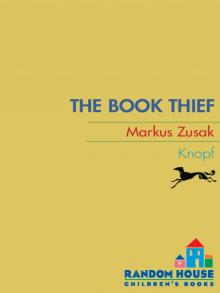 The Book Thief
The Book Thief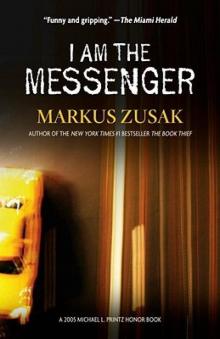 I Am the Messenger
I Am the Messenger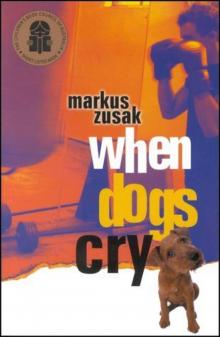 When Dogs Cry
When Dogs Cry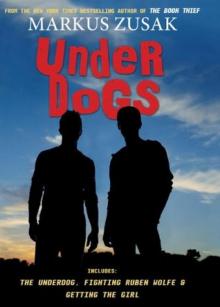 Underdogs
Underdogs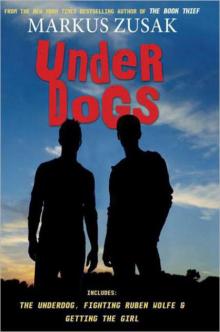 Underdogs: Three Novels
Underdogs: Three Novels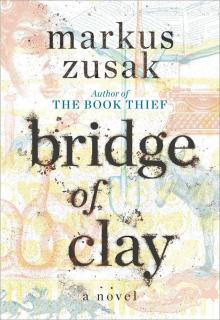 Bridge of Clay
Bridge of Clay